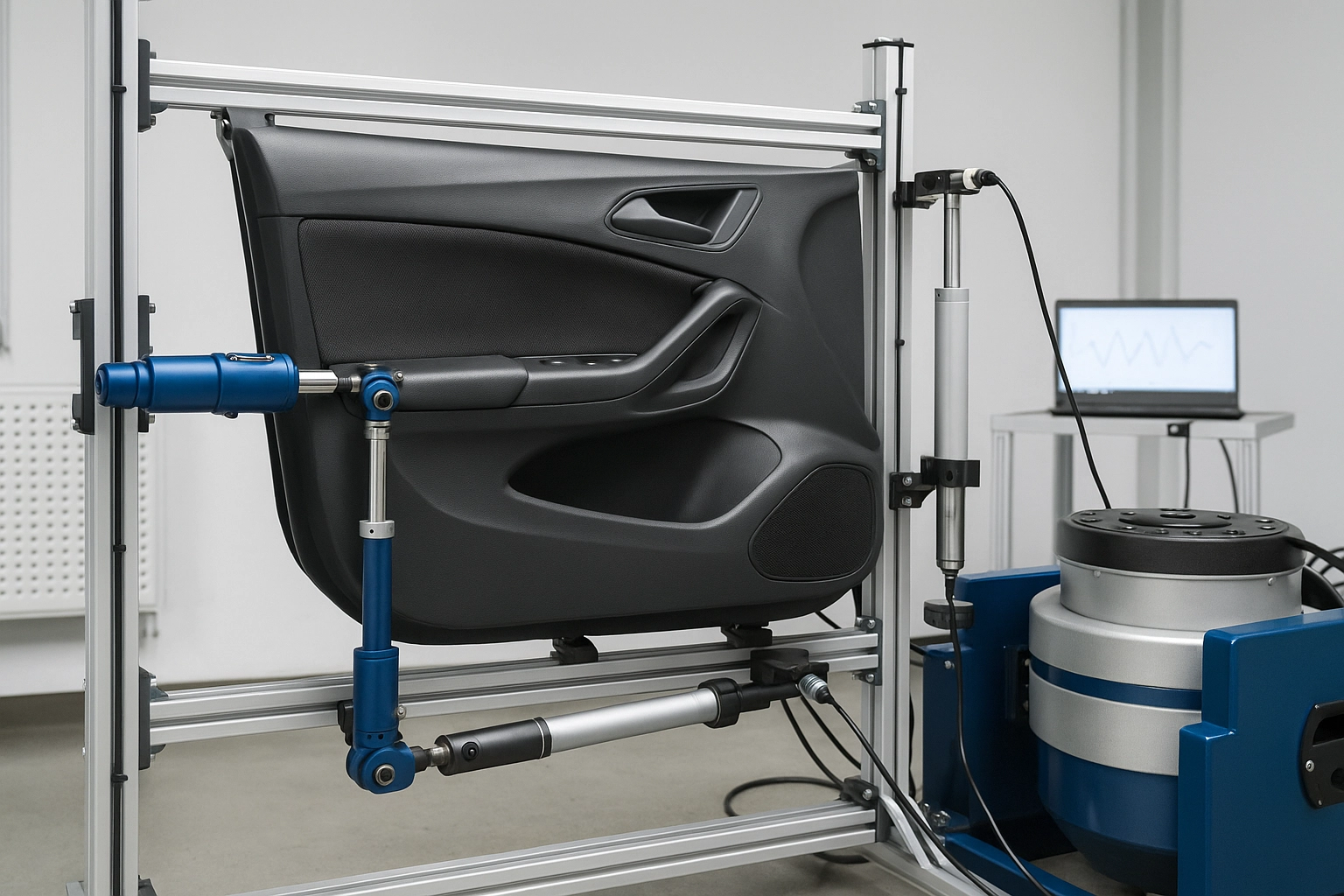EN 60068-2-27 Shock BSR Testing for Vehicle Electronics
The EN 60068-2-27 standard outlines the procedures for performing shock tests on various types of products, including vehicle electronics. This type of testing is crucial in identifying potential issues related to Buzz, Squeak & Rattle (BSR) that can arise due to mechanical stress or environmental conditions during transportation and use.
When it comes to automotive electronics, the integrity and reliability are paramount. In this context, BSR refers to the unwanted sounds and vibrations that occur when components within the vehicle undergo mechanical shock. These issues can be particularly problematic in high-stress environments such as those experienced by vehicles during transportation or under harsh environmental conditions.
The purpose of EN 60068-2-27 testing is to ensure that the tested components and systems are capable of withstanding the expected levels of mechanical shock without failure. This standard helps in maintaining product quality, enhancing safety, and reducing warranty claims by identifying any potential weaknesses early on.
The test setup involves subjecting the specimen to specified shock levels using a half-sine pulse waveform. The duration and amplitude of these pulses are defined according to the requirements outlined in EN 60068-2-27, which considers factors such as the type of vehicle electronics being tested and its intended use.
Preparation for this test includes ensuring that the specimen is correctly mounted on a fixture designed to replicate real-world shock conditions. It is also important to ensure that all connections are secure to prevent any accidental disconnections during testing, which could lead to false results or damage to the specimen.
The testing process itself involves applying controlled mechanical shocks to the specimen using a test machine capable of generating half-sine pulses within the specified frequency range. The goal is to simulate the shock conditions that the vehicle might encounter over its lifecycle.
Once the testing is complete, detailed reports are generated, providing comprehensive information about how each component or system performed under shock conditions. This includes not only pass/fail results but also insights into any issues detected during the test run. These reports are invaluable for quality assurance and continuous improvement efforts within automotive manufacturers.
Scope and Methodology
| Parameter | Description |
|---|---|
| Type of Testing | Shock testing for BSR issues in vehicle electronics. |
| Test Standard | EN 60068-2-27. |
| Shock Levels | Defined half-sine pulses within the specified frequency range for the specimen. |
| Test Setup | The specimen is mounted on a fixture to replicate real-world shock conditions. |
| Data Collection | Comprehensive reports detailing the performance of each component or system under shock conditions. |
Eurolab Advantages
At Eurolab, we pride ourselves on providing world-class testing services that meet the highest standards of accuracy and reliability. Our EN 60068-2-27 Shock BSR Testing for Vehicle Electronics service is no exception.
We have a team of highly qualified engineers with extensive experience in automotive electronics testing, ensuring that every test we conduct adheres strictly to international standards like ISO, ASTM, and EN. This ensures consistent results that are both accurate and repeatable.
Our state-of-the-art facilities provide the necessary equipment and environment for conducting these tests under controlled conditions. We use cutting-edge technology to ensure precise application of shock levels and thorough data collection, which is crucial for identifying even subtle issues in vehicle electronics.
We also offer a range of additional services that complement our core testing capabilities, such as custom fixture design for unique specimen types and advanced signal processing techniques for enhanced data interpretation. Our commitment to excellence extends beyond just conducting tests; we provide detailed recommendations on how to improve product performance based on the test results.
Our clients benefit from our expertise in not only meeting regulatory requirements but also exceeding them, thus ensuring that their products are superior and reliable in every aspect. With Eurolab by your side, you can trust that your vehicle electronics will be robust enough to withstand any shock they encounter during use or transportation.
Why Choose This Test
- Ensures Compliance: Adherence to international standards like EN 60068-2-27 ensures that your products meet global regulatory requirements.
- Promotes Safety: By identifying potential BSR issues early, you can prevent accidents and enhance overall vehicle safety.
- Enhances Reliability: Testing under controlled conditions helps in understanding how your products will perform in real-world scenarios, leading to more reliable designs.
- Reduces Warranty Claims: Identifying and addressing potential issues before they become significant problems can significantly reduce the number of warranty claims.





